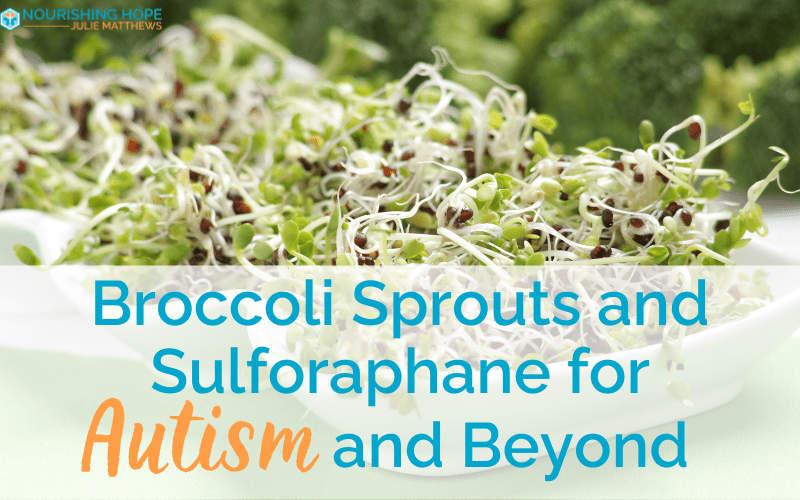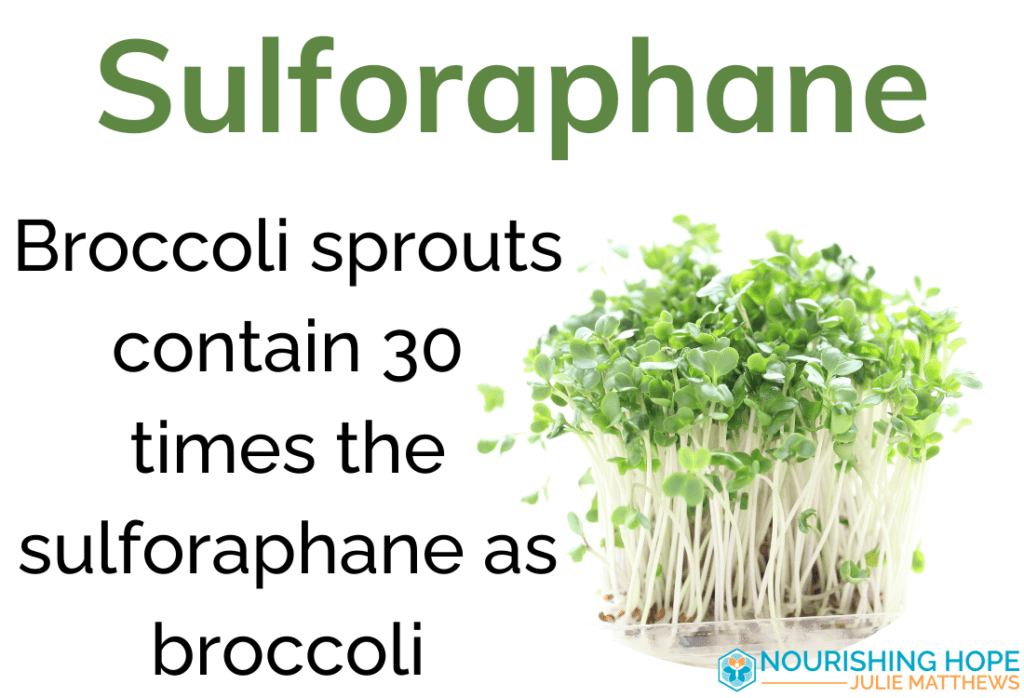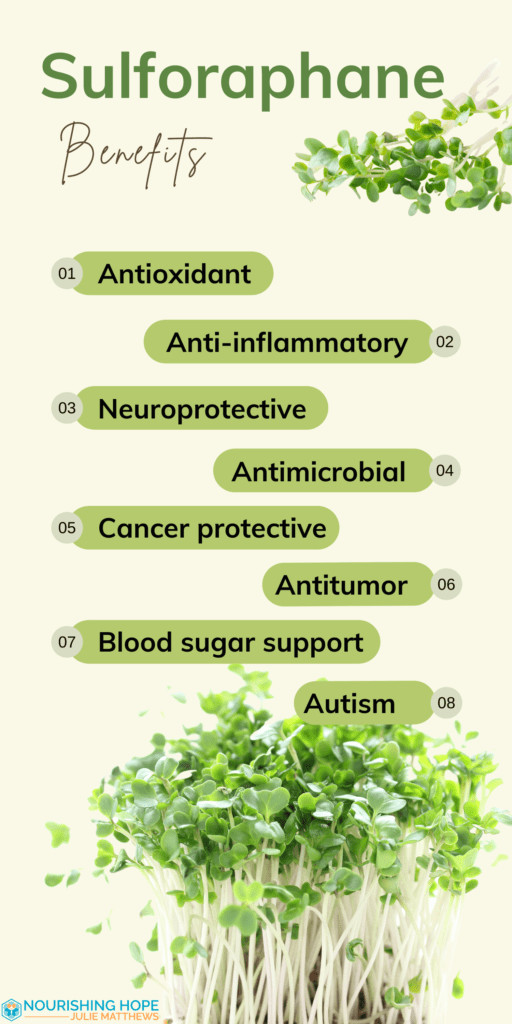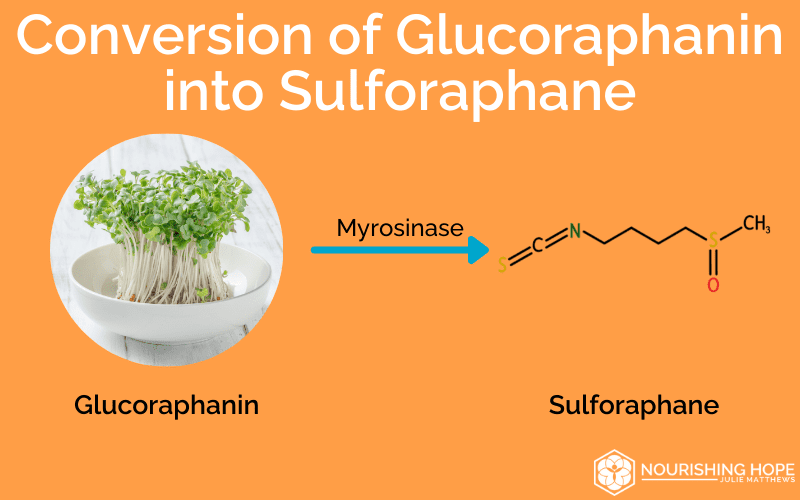
Did you know that broccoli sprouts can improve autism symptoms and other neuroinflammatory conditions? At first, I thought it was too good to be true until I looked into the science much further. How could this one tiny food do so much good?
Sulforaphane Increases Glutathione
Broccoli sprouts contain large amounts of a compound called glucoraphanin, the precursor to sulforaphane. Sulforaphane is a phytochemical that has been known to help increase glutathione production. Glutathione is the major antioxidant in the body and reduces oxidative stress. It supports a strong immune system and is also crucial for the nervous system and gastrointestinal system. It’s also very important in detoxification. I’ve written about sulforaphane with regard to reducing free radicals associated with pesticide use.
Autism and Sulforaphane
 Studies show children with autism are low in glutathione.[1] And boosting glutathione supports the underlying systems negatively impacted in autism and can reduce the symptoms of autism.[2] So, broccoli sprouts and sulforaphane can help.
Studies show children with autism are low in glutathione.[1] And boosting glutathione supports the underlying systems negatively impacted in autism and can reduce the symptoms of autism.[2] So, broccoli sprouts and sulforaphane can help.
Studies on sulforaphane show it improves mitochondrial function and reduces neuroinflammation (two underlying biochemical contributors to the symptoms and severity of autism) and has been shown to improve autism symptoms.[3]
In a follow up paper on these participants, researchers found that because of the beneficial results, many of the participants continued taking the sulforaphane supplement and their reduction in behavioral symptoms of ASD persisted. In fact, their benefits lasted for three years.[4]
In another clinical trial on children with autism they found that sulforaphane supplementation resulted in improvements in both urinary metabolites (biochemical markers of underlying dysfunction) and measures of behavior.[5] They measured behavior via the Aberrant Behavior Checklist (ABC) and Social Responsiveness Scale (SRS) at baseline and at the end of the 12 week study, and the improvements in SRS results were statistically significant. They found changes in 77 metabolites that correlated with improvements in symptoms. These metabolites included markers that indicated:
- Decreases in oxidative stress (often high in children with autism)
- Beneficial changes in amino acids associated with the gut microbiome
- Improvements in neurotransmitters
- Positive changes in hormones including those related to stress
- Changes a type of lipid involved with the myelin sheath in nerves and the brain.
And for a concise look at some of the scientific research, this systematic review on sulforaphane for autism[6] does a great job of going through the literature and distilling down some of the key discussion points via a chart comparing 5 different studies involving autism.
This new research gives us hope and is promising news for autism!
Benefits Beyond Autism
Clinical trials have demonstrated sulforaphane’s ability to produce favorable outcomes in a wide variety of health conditions. And, there are supplement options available to consumers that yield sufficient sulforaphane to match the doses used in clinical trials.[7]
What are some additional benefits of broccoli sprouts?
Many scientific studies have shown that eating cruciferous vegetables such as broccoli, cauliflower, kale, and cabbage either raw or lightly cooked can protect against a number of cancers. Sulforaphane has been found to slow tumor growth and also stop benign carcinogens from converting into active ones. One study found that 3 to 5 servings of cruciferous vegetables each week reduced cancer risk by up to 40%, and studies on sulforaphane have found it to be chemoprotective and have other health benefits.[8]
 Sulforaphane also helps fight the type of bacteria (H. pylori) that causes ulcers. In fact, one mouse study found that it may even be more effective at treating ulcers than antibiotics when faced with antibiotic-resistant strains and can reduce the risk of associated stomach cancer![9] In another study they correlated these results in both humans and mice as well.[10]
Sulforaphane also helps fight the type of bacteria (H. pylori) that causes ulcers. In fact, one mouse study found that it may even be more effective at treating ulcers than antibiotics when faced with antibiotic-resistant strains and can reduce the risk of associated stomach cancer![9] In another study they correlated these results in both humans and mice as well.[10]
Other studies have shown that sulforaphane may be an effective treatment for a number of mental health disorders.[11] Sulforaphane may help reduce levels of glutamate, a compound I have talked about quite frequently, which has been linked to disorders like depression and schizophrenia. And in children with autism, glutamate can also be a problematic excitotoxin, which may also be at least one reason why sulforaphane is showing so much promise in this population.
Sulforaphane also has neuroprotective benefits. In a study reviewing the neuroprotective effects, researchers highlighted the mechanisms of action of sulforaphane and benefits on various neurological and neurodegenerative conditions including Alzheimer’s, memory, Parkinson’s, psychosis, stroke, epilepsy, toxin exposure, and more. [12]
There is even research looking at the potential for sulforaphane to aid in the reversal of type 2 diabetes. The form of sulforaphane used was a concentrated broccoli sprout extract. The results were that it reduced fasting blood glucose and glycated hemoglobin (HbA1c) in obese patients with dysregulated type 2 diabetes.[13]
Broccoli Sprouts Conversion to Sulforaphane
Broccoli sprouts contain 30 times the amount of sulforaphane precursor as the mature broccoli plant! And as such, broccoli sprouts are by far the best source of sulforaphane. Other cruciferous vegetables and sprouts do not compare to the levels of sulforaphane in broccoli sprouts.
You can get sulforaphane through broccoli sprouts (and can even make your own broccoli sprouts at home) or by taking it in supplement form.
Are all supplements the same? Unfortunately, no, they are not.
Some supplements use ground broccoli seeds and some use powdered broccoli sprouts. They also have different ways of measuring the active ingredient, so products can vary significantly.
Another key component to the potency and efficacy of your sulforaphane supplement is an enzyme called myrosinase. Myrosinase is needed to convert sulforaphane glucosinolate into sulforaphane in the small intestine. If a supplement does not contain myrosinase, there could be an issue with conversion into sulforaphane, especially if the individual has GI issues like leaky gut.
One product I have used personally is EnduraCell by Cell-Logic. This product does have myrosinase and is a pure, potent formulation. The other brand I like and has been used effectively in studies is Avmacol®, which also has myrosinase.

Raw Sprouts Compared with Supplements
Understanding the benefits of sulforaphane and then considering the issues I discussed above (conversion of sulforaphane glucosinolate into sulforaphane), things can get confusing! But, I found a study that was helpful in breaking down this issue.
Clarke, et al compared plasma and urinary excretion in 12 subjects with 4 subjects in the control group who got alfalfa sprouts and placebo pills. They first gave the test subjects fresh broccoli sprouts, measured their levels and then had a 1 month “washout” period where they were not given the sprouts or a supplement. Then, they gave the subjects 6 pills of a broccoli supplement and once again measured their levels. What they found was exciting to me!
“Although similar doses of glucoraphanin and glucoerucin were given in the sprouts and supplement, the total amounts of SFN and ERN metabolites in the plasma and urine were much lower in the supplement group compared to the sprout group.”[14] The subjects got more sulforaphane out of raw sprouts than the supplement! But keep in mind, not all supplements are created equally and the supplement used was an inactivated-myrosinase product, so there may be better equivalency depending on the product you use (such as one with myrosinase). And if you’re eating raw sprouts, they contain myrosinase that’s released through chewing!
So to give you an idea of what that means in terms of quantity of sprouts you would need to eat, the Clarke, et al study used 40 grams of fresh sprouts. That ends up to be about ⅔ of a cup. These were all adult subjects so that gives you an idea of serving size to work from.
The prevailing science seems to point to raw sprouts outperforming supplements, especially if the product does not contain myrosinase. If you have the ability to make your own or buy them and you can get them into your child, that would be great! If you feel like a supplement is more conducive, then look for one that contains myrosinase.
As you can see, sulforaphane is an intriguing compound with a variety of benefits, including general detoxification support which we all can use! If you prefer to use food rather than supplements, then you will want to check out my blog, Make Your Own Broccoli Sprouts because we make our own broccoli sprouts, and you can too. It’s very easy.
Amazon Disclaimer: Julie Matthews and Nourishing Hope is a participant in the Amazon Services LLC Associates Program, an affiliate advertising program designed to provide a means for sites to earn advertising fees by advertising and linking to Amazon.com.
FTC Disclaimer: Some links may be affiliate links. We may get paid if you buy something or take an action after clicking one of these.




My husband and I have a small farm and a dna tested A2/A2 milk cow. We also have custody of our 4 yr old, severely autistic, nonverbal granddaughter. What is your opinion about raw, a2/a2 milk products?
Lori… please see our articles about milk, including A2 milk, here https://nourishinghope.com/?s=raw+milk
Hello , I have a 9 year old daughter who’s autistic . I read about broccoli sprouts last couple days. I have purchased one on Amazon start today . I will like to know how many times per day should I give it to her to get the benefit.
It comes with a little scoop and they said Each scoop is equivalent to 1/4 cup of a fresh broccoli sprouts.
Thank you !
I am sprouting my first batch now. I first heard about this from my sons neurologist ( Dr Andrew Zimmerman) whom I think was part of a study on broccoli sprouts and autism. My son has FASD and ADHD. Do you know of any benefits for the damaged FASD brain. Also, in general, have you worked with anyone with FASD?
Hi Jenny, It’s great to hear a neurologist supporting nutrition intervention. Let us know how the broccoli sprouts go. I did a quick research for you on “sulforaphane and fetal alcohol syndrome” and found this study. https://www.frontiersin.org/articles/10.3389/fcell.2021.622152/full. This article is about prevention (before FASD) and I’m not giving any clinical advice, but it might be interesting to share the research with your doctor. All the best to you. Keep nourishing hope!
Thank you Julie for everything that you do :). Could this be used for people with CBS mutation as well?
Hi Ewa, everyone is different. I haven’t seen any specific research on sulforaphane and CBS. It depends on the person, the nature of their specific CBS SNP variants, and the level of sensitivity they have to sulfur.
Julie, thank you much for your response and again for your tireless brilliant work. Many blessings 🙂
Thank you Ewa!
Ewa, I did a very quick search of the research and found this study. But it will take some interpretation to determine if it would be beneficial for the individual depending in their SNPs. https://pubmed.ncbi.nlm.nih.gov/31594422/
Wow! So excited to read through this article and comments. THANK YOU!
I plan to make a juice for myself and my daughter. How much should we use (for a 4 year old child) daily? Do you think that juicing every other day or freezing the juice and then thawing an Ice cube or 2 daily would destroy the sulphoraphane content?
Blessings 🙏
Hi Karyel, You’re welcome! I’m glad you liked the article. You can look at the amounts of broccoli spouts used in the studies that I mention, and go from there to decide how much you want to do. Usually, I like to start small.
My son is really picky. Can I make a puree?
You can juice or blend the sprouts into a juice/smoothie with whatever fruits/flavours he likes. My daughter is also a picky drinker so I’ll make it extra concentrated to make sure she drinks it all.
Good luck!
Yes, you can make a puree or blend them. The are a bit spicy so masking or diluting the flavor with other fruits and vegetables can help.
thank you for this wonderful step by step guide to access a wonderful food that is life changing, i always wondered if i did it right, now more confident and motivated I thank you!
Where I am in Australia, we receive lots of feedback from clinicians who use 100% whole broccoli sprout capsules to treat their autism patients. (Easier for doctors to prescribe than fresh sprouts with their uncertain sulforpahane yield).
(I must also disclose that my company manufactures these high sulforpahane-yielding capsules as well as a tasty powdered version naturally flavored with pomegranate juice and coconut water for children who can’t swallow capsules).
Around 20 mg daily of sulforaphane is the dose we recommend for activating the expression of the 2000 or so genes that are associated with cellular defences. This includes that genes coding for glutathione.
Thanks for sharing Christine. What’s the name of your product? Do you ship internationally?
Dr. Houghton, I really like that brand. It’s one of my personal favorites! They have capsules
https://www.dssorders.com/dnswexd.asp?id=9685 and this powdered product you mentioned: https://www.dssorders.com/dnswexd.asp?id=12247.
Hi Dr Houghton.
Can you please share the link of the sulphurophane capsules that you use for autism patients.
Thanks
Read further in the comments. I mention the supplement I believe she is referring to.
Hi Julie,
Thank you so much for this article. I wanted to purchase the sulphoraphane capsules, but it looks like I need a code to register on that specific website. Is there another way I can obtain the capsules mentioned above? THank you!
As you are aware most autistic kids are very picky eaters….
Definitely Ken. About 80% of children with developmental delays are picky eaters. There are some strategies and ideas mentioned in the comments that helps some kids enjoy them more like blending them with fruits.
Well, my juicing plan didn’t work. My daughter is a very picky drinker… she doesn’t even like drinking much freshly squeezed (just fruit) juice. But she might eat the sprouts raw on a good day. She took me by surprise one day and took it off my plate. Or I make a sundried tomato or basil pesto and add them. It has to be silky because she won’t tolerate chunks, and she’s new to accepting sauces, so it’s not a lot. I still haven’t been able to feed her these every day or in the amounts recommended, but I hope it’s something we can work on in the future. Don’t give up!
Wonderful, Karyel. Yes, thanks for sharing your experience and encouraging families to not give up. Keep nourishing hope. 🙂